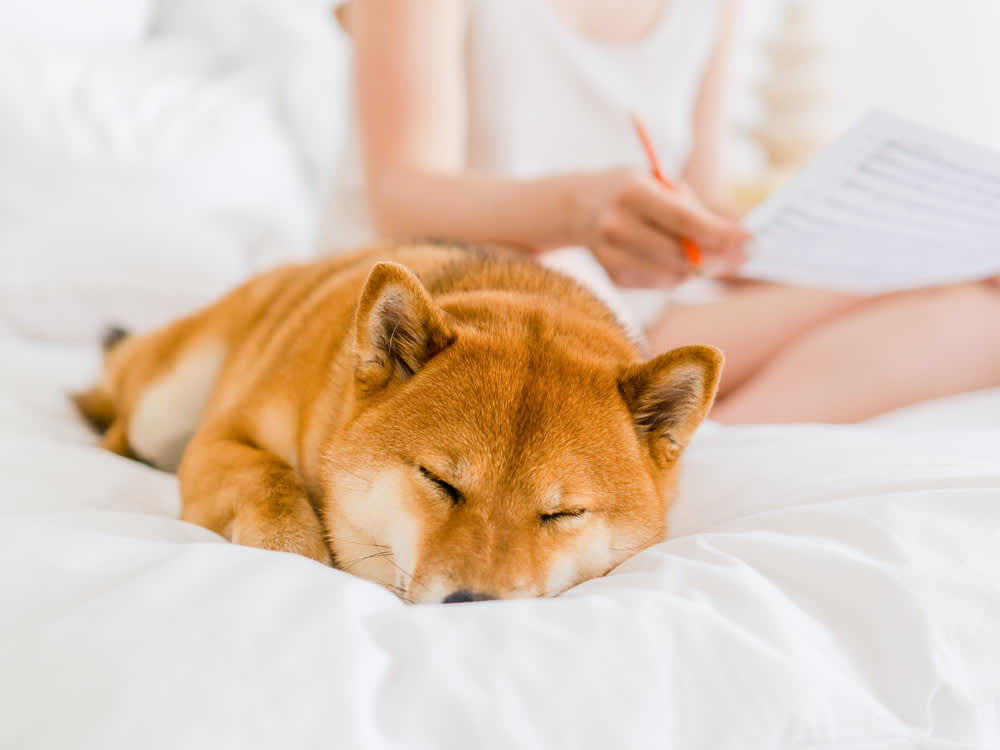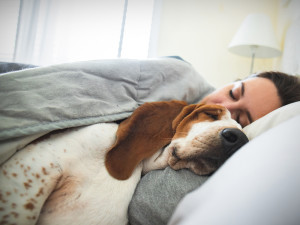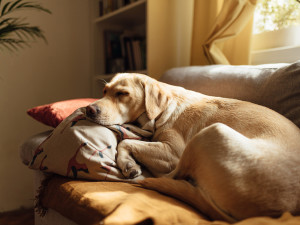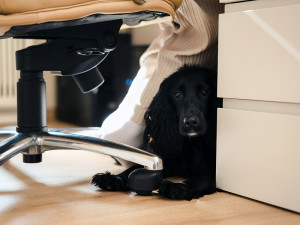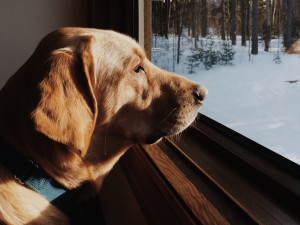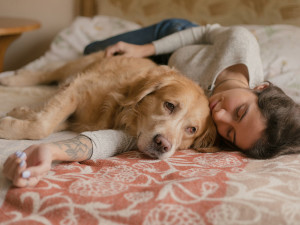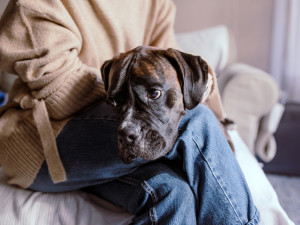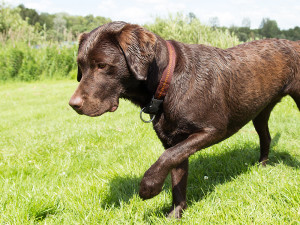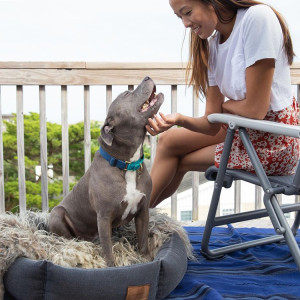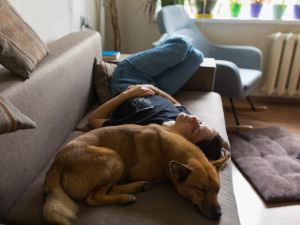My Dog Sleeps All Day—Is That Normal?
Dogs need more sleep than humans. Here’s how much is healthy.
Does your dog spend all day sleeping? Even if that sounds like the perfect day to you, should they be snoozing for that long? And how much sleep does a dog need? Learn about dog sleep habits and the reasons why your dog sleeps a lot.
Dogs need a lot of sleep! The average dog sleeps for about 12 to 14 hours a day. However, there are a few factors that can affect how much sleep a dog needs, including their age, breed, and activity level. If your dog is sleeping more or less than the recommended amount, it is important to talk to your veterinarian. There may be an underlying medical condition that is causing your dog to sleep more or less than usual.
How much sleep do dogs need?
If you’re a first-time dog parent, you might be surprised by just how much sleep your dog needs. The average dog will sleep between 12 to 14 hours a day. This is generally made up of day-time naps and overnight sleep.
How much do you spend on your pet per year?
Puppies sleep longer than average, typically sleeping 18 to 20 hours a day until around 12 weeks of age. Later, as dogs start to reach their senior years, they will sleep more as their bodies and minds tire more quickly. Size, activity, age, and health are all factors in how much sleep a dog needs but most pet parents should expect their adult dog to sleep at least half of the day.
Sleep Needs Change as Dogs Age
In a studyopens in new tab on dogs’ sleep patterns, a team of researchers looked into the effects of age and feeding frequency on dogs’ sleep patterns. Dogs were grouped into one of three age ranges (1.5 to 4.5 years, 7 to 9 years, 11 to 14 years) and were fed once or twice daily.
Researchers found that older and middle-aged dogs slept more during the day than young adult dogs, but that was because they took more naps and not because their naps were longer. Older and middle-aged dogs also slept more at night than younger dogs because they had a longer total sleep interval at night (waking up later) and woke up fewer times during the night.
Dogs of all ages were affected similarly by being fed twice daily instead of once a day. Dogs fed more frequently took fewer naps during the day, but the naps lasted longer. Dogs fed twice a day fell asleep earlier at night but woke up earlier, too, with a decrease in total time sleeping at night.
Is it OK if my dog sleeps all day?
Regardless of a dog’s life stage, many pet parents may wonder, “Is it OK that my dog sleeps all day?” The answer is typically yes. Your dog should spend about half of their day sleeping. As long as your dog is maintaining normal activity and food intake while awake, getting plenty of rest during the day is normal.
When should I take my dog to the vet for excessive sleeping?
You should consult with your veterinarian if you notice an abrupt change in your dog’s sleep or waking behaviors. While the number of hours a dog sleeps will gradually shift during their life, it’s not normal for them to go from sleeping 12 hours a day to being a lump for 20 hours straight. Many illnesses can sap the energy out of a pup. Your dog should also be easy to wake and excited to perform their favorite activities when they’re up. See your vet if your dog is sleeping way more than usual, is very difficult to wake, or will not get up for enjoyable activities like meals or walks.
Why does my dog sleep so much?
Much like us, dogs need sleep to remain healthy. The human sleep cycle in a 24-hour period is fairly simple. We are awake during the daytime and have one long sleep at night. While we sleep, we cycle through restorative phases of REM (rapid eye movement) and non-REM sleep. Sleep allows the body to restore tissue and strengthen the immune system.
During REM, brain activity increases, and this is good for learning and development as well as retaining information and memories. The National Institute of Neurological Disorders and Stroke states that during REM, the brain exercises important neural connections, which are key to mental and overall well-being.
Dogs have a more scattered sleep pattern within a 24-hour period, consisting of short naps throughout the day and a long sleep during the night. These periods of sleep are punctuated with waking up to check their environment and scan for changes/dangers. Dogs enter into REM quicker than humans (which is why you often see them acting out dreams). However, one theory suggests that this constant state of readiness leads to less REM sleep, causing dogs to need to sleep more in order to feel restored.
When dogs don’t get enough sleep, they can become sleep deprived; common symptoms from lack of sleep may start to appear, though they’re not as easy to notice as they are in people.
What if my dog is restless at night and won’t sleep?
If your dog is restless at night and won’t sleep, start by evaluating your dog’s environment and routine. Make any necessary adjustments to establish a routine with set times for meals, walks, and play. This may help your dog expend enough energy by nighttime. Make sure your dog’s environment is conducive to sleep with minimal stressors. If your dog is still restless at night despite these adjustments, then talk to your vet. Your dog may have a true sleep disruption problem.
Signs your dog isn’t getting enough sleep
If your dog isn’t napping during the day and is consistently restless at night, that’s not normal. A lack of sleep may cause them to be whiny, sluggish, or disinterested in play. Displaying these symptoms on occasion is OK, and you can allow for a cranky day once in a while. If the behavior persists, it's cause for concern.
Dogs who have severe sleep disorders will exhibit more concerning behaviors such as excessive whining or crying, becoming disoriented when performing basic tasks, or becoming aggressive because they are increasingly on edge from the lack of rest. You may notice your dog becoming more irritable and agitated. On the flip-side, they could begin to withdraw socially and stop engaging as they previously would have.
Signs that your dog isn’t getting enough sleep can come on suddenly or gradually. Any symptoms that are concerning should be discussed with your veterinarian to rule out the possibility of medical issues.
Reasons your dog can’t sleep
Your dog may be suffering from insomnia for a number of reasons:
Pain, illness, or injury
Painful arthritis could be causing insomnia as your dog cannot be still and feel comfortable. Prescribed pain relief, special massage treatments, or different bedding could help. Sleep apnea, which is commonly seen in flat-faced and obese dogs, will cause a dog to jolt awake when their airway is blocked. Multiple sleep interruptions can be frustrating and leave a dog feeling constantly tired. After a vet has ruled out any medical issues, the next step is to look at other possible causes for your dog’s restlessness.
Lack of exercise
A lack of exercise is the root cause of many behavioral issues. Your dog needs an outlet to expend energy. Depending on your dog’s age and energy level, the amount of exercise they need can vary, but it is key to understand the type of dog you have and meet that required amount of exercise.
A lack of exercise and enrichment can lead to a buildup of energy and frustration. As well as being destructive or demotivated, dogs can also become agitated and anxious, creating sleep problems. When you add insufficient sleep to those feelings, things can escalate quickly. A tired dog equals a sleeping dog.
Anxiety
Anxiety is another leading cause of sleeping problems. Dogs can feel anxious for all sorts of reasons. Getting to the bottom of the anxiety is the healthiest way to get your dog’s sleep into a regular pattern. Here are some common causes of anxiety in dogs:
New surroundings
Separation from companion(s)
Changes to the family — new additions or people/animals leaving
Neglect
Fear
Lack of exercise
Scary sounds, such as fireworks, thunderstorms, or construction
Forced socialization
Past trauma
All dogs are individuals, and the cause of their anxiety could be something as seemingly innocuous as the sound of the vacuum cleaner. Many dogs feel anxious when left alone or separated from their humans. When left alone, which is typically when dogs nap during the day, these dogs are pacing, whining, or looking out the window. Their cortisol levels are gradually rising and their anxiety is growing. They are never fully relaxed. If your dog is suffering from anxiety, speak to a qualified behaviorist or trainer on how best to make your dog feel more comfortable on their own.
Are there sleep aids for dogs?
If your dog is having trouble sleeping, consult with your veterinarian before pursuing sleeping aids for your dog. Underlying medical issues should be ruled out first. A dog may be up at night because of underlying pain or sudden urges to urinate or defecate.
A sleep aid isn’t the most appropriate treatment for those conditions, and addressing the underlying issue can certainly help your pup get better sleep. Older dogs may develop a neurological or cognitive disease that causes confusion and sleepless nights. In these cases, finding a remedy (prescription or over the counter) may take a bit of trial and error, but your veterinarian can make recommendations to help.
The bottom line: If your dog sleeps intermittently during the day and throughout the night, that’s a good sign. It likely means they are getting plenty of exercise, they have a well-balanced and healthy diet, and they are extremely content and feel safe in their surroundings.
FAQs
Can I help my dog establish a sleep routine?
While dogs are naturally diurnal and get long stretches of sleep at night, they also take plenty of naps during the day. Establishing routine for meals, walks, and exercise can help normalize your dog’s sleep schedule.
How can I help my dog get enough quality sleep?
Help your dog get quality sleep by making sure they get enough exercise and routine vet care so that issues that may impact sleep are caught early. Providing a safe, comfortable, low-stress environment can also help your dog get quality sleep.
Should I wake my dog up if they are sleeping too much?
Keep in mind that your dog needs 12 to 14 hours of sleep per day, so make sure you let them get plenty of rest. It’s OK to wake your dog up for meals, exercise, or other activities. Consult with your vet if your dog is difficult to wake.
